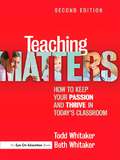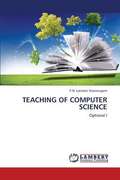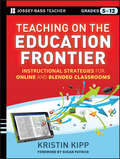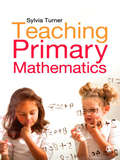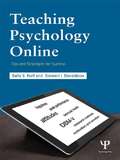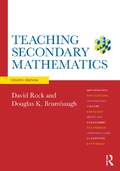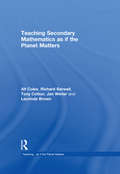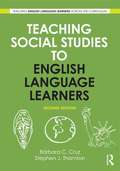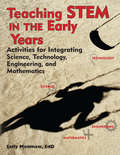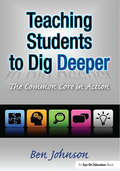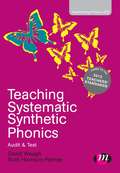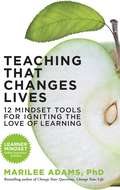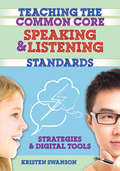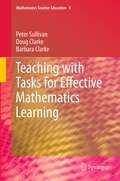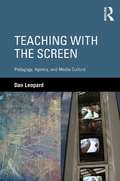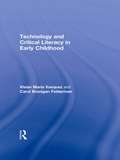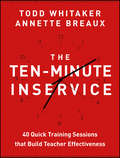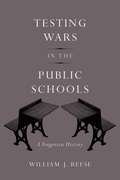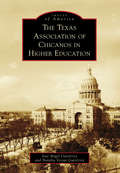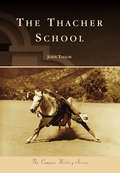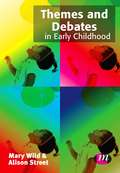- Table View
- List View
Teaching Matters: How to Keep Your Passion and Thrive in Today's Classroom
by Todd Whitaker Beth WhitakerRecharge your batteries and rekindle your excitement about teaching! This new, updated edition of the best-selling book, Teaching Matters: Motivating and Inspiring Yourself, offers practical advice on working with colleagues for inspiration, using social media to connect to other professionals, and adding fresh new appeal to your lessons. The practical ideas and inspirational examples in this book will help you keep your passion for education alive and thriving in your classroom. Get use-now tips on everything from creating a positive atmosphere in the classroom to dealing with difficult peers. This is truly a must-have motivational resource for all educators!
Teaching Of Computer Science
by P.N. Lakshmi ShanmugamThis book has been written as a basic textbook for B.Ed student teachers who have chosen one of the optional subjects as computer science -I studying in the B.Ed colleges affiliated to Tamil Nadu Teachers Education University. The importance of systematic and organized knowledge can hardly be exaggerated in this book. Ten chapters namely Hardware and Software, Aims of Teaching Computer Science, Micro-teaching, Lesson Plan and Unit Plan, Methods of Teaching. Teaching Aids. Curriculum, Evaluation in Education, Textbook, Assignment and Review are described in a simple language with images and necessary illustrations to enable the student teachers to understand it clearly and easily. It highlights skills and values for everyday use based upon Bloom's taxonomy of educational objectives. A complete and detailed description of computer science library is helpful to the students in stimulating the ideas about digital library. Greater emphasis is given to the use of different types of tests and construction of Achievement test towards the improvement of learning and instruction.
Teaching Of Computer Science
by P.N. Lakshmi ShanmugamThis book has been written as a basic textbook for B.Ed student teachers who have chosen one of the optional subjects as computer science -I studying in the B.Ed colleges affiliated to Tamil Nadu Teachers Education University. The importance of systematic and organized knowledge can hardly be exaggerated in this book. Ten chapters namely Hardware and Software, Aims of Teaching Computer Science, Micro-teaching, Lesson Plan and Unit Plan, Methods of Teaching. Teaching Aids. Curriculum, Evaluation in Education, Textbook, Assignment and Review are described in a simple language with images and necessary illustrations to enable the student teachers to understand it clearly and easily. It highlights skills and values for everyday use based upon Bloom's taxonomy of educational objectives. A complete and detailed description of computer science library is helpful to the students in stimulating the ideas about digital library. Greater emphasis is given to the use of different types of tests and construction of Achievement test towards the improvement of learning and instruction.
Teaching on the Education Frontier: Instructional Strategies for Online and Blended Classrooms Grades 5-12
by Kristin KippA groundbreaking guide to facilitating online and blended courses This comprehensive resource offers teachers in grades K-12 a hands-on guide to the rapidly growing field of online and blended teaching. With clear examples and explanations, Kristin Kipp shows how to structure online and blended courses for student engagement, build relationships with online students, facilitate discussion boards, collaborate online, design online assessments, and much more. Shows how to create a successful online or blended classroom Illustrates the essential differences between face-to-face instruction and online teaching Foreword by Susan Patrick of the International Association for K-12 Online Learning This is an essential handbook for learning how to teach online and improve student achievement.
Teaching Primary Mathematics
by Ms Sylvia TurnerTeaching Primary Mathematics covers what student teachers really need to know and why, including approaches to teaching and learning, planning and assessment, and using resources in maths teaching. It also provides a brief historical overview of the teaching of mathematics and examines strategies to enhance learning and development as a confident mathematician in the primary classroom. Informed by seminal and current research, and recent developments in education policy, the book also explores: - the role of mathematics within the primary curriculum - the development of mathematics as a subject of study - the knowledge that can be gained from considering international approaches to mathematics. This is essential reading for all students on primary initial teacher education courses including undergraduate (BEd, BA with QTS), postgraduate (PGCE, SCITT), and School Direct, and employment-based routes into teaching. Sylvia Turner is Senior Lecturer in the Faculty of Education at the University of Winchester.
Teaching Psychology Online: Tips and Strategies for Success
by Kelly S. Neff Stewart I. DonaldsonIntended as a resource for psychology educators ranging from teaching assistants to experienced faculty, this book shows readers how to effectively create and manage an online psychology course. Guidelines for preparing courses, facilitating communication, and assigning grades are provided along with activities and assessments geared specifically towards psychology. Pedagogical theories and research are fused with the authors’ teaching experiences to help maximize the reader’s abilities as an online psychology instructor. The book focuses on psychology education at the undergraduate level but it also includes material appropriate for graduate students and professionals. Readers will find helpful examples from all the major content areas including introductory, social, developmental, biological, abnormal, and positive psychology, and human sexuality. Every chapter is organized around 3 sections. The Purpose part introduces the key concepts, theory, and research. The Implementation section reviews the ‘nuts and bolts’ of online teaching, and the Troubleshooting section addresses key problems and potential solutions. 'Text boxes' highlight important tips. The website http://www.TeachingPsychologyOnline.com provides additional tips, links to related articles and other resources, and examples of online psychology assignments from across the discipline. The book addresses: launching your online course; enhancing student/instructor communication; modes of multimedia and how to integrate them into your course including lecture videos, podcasting, blogging, wikis, and social networking sites; creating activities for online courses; assessment and grading; and online education trend including doctoral level education. Ideal for instructors teaching ANY psychology course, from introductory to upper-level undergraduate to graduate courses, this text can be used for developing on line courses in applied areas such as counseling, health, and industrial psychology as well as for courses in social, cognitive, and developmental psychology. Instructors of any technical skill level can use this book, including those familiar with Blackboard to those who are just getting started. Whether you are a seasoned pro or new to teaching psychology online, the tips in this book can help improve your instruction, reduce your prep time, and enhance your students’ success.
Teaching Secondary Mathematics
by David Rock Douglas K. BrumbaughSolidly grounded in up-to-date research, theory and technology, Teaching Secondary Mathematics is a practical, student-friendly, and popular text for secondary mathematics methods courses. It provides clear and useful approaches for mathematics teachers, and shows how concepts typically found in a secondary mathematics curriculum can be taught in a positive and encouraging way. The thoroughly revised fourth edition combines this pragmatic approach with truly innovative and integrated technology content throughout. Synthesized content between the book and comprehensive companion website offers expanded discussion of chapter topics, additional examples and technological tips. Each chapter features tried-and-tested pedagogical techniques, problem solving challenges, discussion points, activities, mathematical challenges, and student-life based applications that will encourage students to think and do. New to the 4th edition: A fully revised and updated chapter on technological advancements in the teaching of mathematics Connections to both the updated NCTM Focal Points as well as the new Common Core State Standards are well-integrated throughout the text Problem solving challenges and sticky questions featured in each chapter to encourage students to think through everyday issues and possible solutions. A fresh interior design to better highlight pedagogical elements and key features A companion website with chapter-by-chapter video lessons, teacher tools, problem solving Q&As, helpful links and resources, and embedded graphing calculators.
Teaching Secondary Mathematics as if the Planet Matters (Teaching... as if the Planet Matters)
by Richard Barwell Tony Cotton Alf Coles Jan Winter Laurinda Brown‘This book moves us beyond a theoretical pondering of the issues and makes concrete suggestions for teachers and students for how things can be different in mathematics classrooms. This is long overdue.’ Peter Gates, University of Nottingham Teaching Mathematics as if the Planet Matters explores how Mathematics teachers can develop approaches to curriculum and learning which help students understand the nature of the contemporary world. It sets out a model for teaching and learning that allows teachers to examine existing approaches to teaching and draw upon the insights of mathematics as a discipline to help students relate classroom mathematics to global issues such as climate change, the economy, food supplies, biodiversity, human rights, and social justice. Including practical examples, suggestions for teaching activities and detailed further reading sections, the book covers: the mathematics of description in the measuring, recording and statistical analysis that informs our knowledge of climate change, consumption and sustainability; the mathematics of prediction in the modelling used by governments, scientists and businesses to plan roads, power stations and food supplies and their effects; the mathematics of communication in the news reports, blogs and environmental campaigns, incomplete without graphs, charts and statistics. The true worth of a school subject is revealed in how far it can account for and respond to the major issues of the time. The issue of the environment cuts across subject boundaries and requires an interdisciplinary response. Mathematics teachers are part of that response and they have a crucial role in helping students to respond to environmental issues and representations.
Teaching Social Studies to English Language Learners
by Stephen J. Thornton Bárbara C. CruzTeaching Social Studies to English Language Learners provides readers with a comprehensive understanding of both the challenges that face English language learners (ELLs) and ways in which educators might address them in the social studies classroom. The authors offer context-specific strategies for the full range of the social studies curriculum, including geography, U.S. history, world history, economics, and government. These practical instructional strategies will effectively engage learners and can be incorporated as a regular part of instruction in any classroom. An annotated list of web and print resources completes the volume, making this a valuable reference to help social studies teachers meet the challenges of including all learners in effective instruction. Features and updates to this new edition include: • An updated and streamlined Part 1 provides an essential overview of ELL theory in a social studies specific-context. • "Teaching Tips" offer helpful suggestions and ideas for creating and modifying lesson plans to be inclusive of ELLs. • Additional practical examples and new pedagogical elements in Part 3 include more visuals, suggestions for harnessing new technologies, discussion questions, and reflection points. • New material that takes into account the demands of the Common Core State Standards, as well as updates to the web and print resources in Part 4.
Teaching STEM in the Early Years
by Sally MoomawThe foundation for science, technology, engineering, and mathematics (STEM) education begins in the early years. This book provides more than ninety activities and learning center ideas that seamlessly integrate STEM throughout early childhood classrooms. These hands-on STEM experiences enhance cooking, art, and music activities, block play and sensory table exploration, and field trips and outdoor time. Information on assessment and early learning standards is also provided.Sally Moomaw, EdD, has spent much of her career researching and teaching STEM education. She is an assistant professor at the University of Cincinnati and the author of several early education books.
Teaching Students to Dig Deeper: The Common Core in Action
by Benjamin JohnsonThis important new book identifies the skills and qualities students need, based on the Common Core State Standards, to be really ready for college and careers.Go beyond content knowledge...the deep thinking and learning skills detailed in this book will equip students for success! Prepare your students for their futures by helping them become... Analytic thinkers Critical thinkers Problem solvers Inquisitive Opportunistic Flexible Open minded Teachable Risk takers Expressive Skilled at information gathering Skilled at drawing inferences and reaching conclusions Skilled at using technology as a tool, not a crutch For each skill, you'll learn why it matters, and get a whole host of practical strategies and techniques for bringing the skill to life in the classroom—across the curriculum and for different grade levels. BONUS! You'll get useful, much-needed information on planning high-quality assessments.
Teaching Systematic Synthetic Phonics: Audit and Test (Transforming Primary QTS Series)
by David Waugh Ruth Harrison-PalmerCan you demonstrate a clear understanding of systematic synthetic phonics? If you are training to be a primary school teacher you need to have, and to demonstrate, a clear understanding of systematic synthetic phonics to meet the Teachers' Standards. This companion text to the popular Teaching Systematic Synthetic Phonics in Primary Schools enables you to audit your knowledge, making you more aware of the subject and the areas in which you need to know more. In all chapters, self audits are accompanied by guidance on next steps for developing your knowledge. All chapters feature sections that link your learning to the classroom, showing you how to use your knowledge to teach phonics. Designed to help build your confidence and develop your knowledge of phonics, this text supports your development as an effective teacher of reading. This is a companion text to: Teaching Systematic Synthetic Phonics in Primary Schools Joliffe, Waugh and Carss David Waugh is Director on Primary PGCE at Durham University where he is also the subject leader for English. He has published extensively in Primary English. David is a former deputy head teacher, was Head of the Education department at University of Hull, and was Regional Adviser for ITT for the National Strategies from 2008 to 2010. Ruth Harrison-Palmer is a former acting head teacher. She has worked for the National Strategies and Cumbria Local Authority as a literacy consultant. Currently Ruth has a senior role in ITE at the University of Cumbria.
Teaching That Changes Lives
by Marilee G. AdamsIgniting the Love of Learning In response to educators who are already fans of her bestseller Change Your Questions, Change Your Life, Marilee Adams, the originator of Question Thinking, presents a compelling model for creating a classroom environment infused with curiosity, creativity, and caring. Through a moving story of a teacher on the verge of burnout, Adams demonstrates the powerful influence our mindsets have on how we interact with our students, our colleagues, and ourselves. Through vivid examples, she illustrates how cultivating what she calls a Learner Mindset leads to breakthroughs in critical thinking, communication, and collaboration. Complete with Adams's Choice Map for identifying our own mindsets, a workbook, and access to online resources, this inspiring book will transform teachers and students alike into open-minded, creative, resilient problem solvers and lifelong learners.
Teaching the Common Core Speaking and Listening Standards: Strategies and Digital Tools
by Kristen SwansonDiscover how to integrate the Common Core speaking and listening standards into any grade level or content area with the specific instructional frameworks in this user-friendly guide. Learn how to give your students the skills and experiences they need to become successful communicators in the 21st Century! The frameworks are enhanced with a thorough, easy-to-understand explanation of the Common Core State Standards authentic classroom examples from multiple grade levels and subjects rubrics and assessment options Speaking and listening in the digital age requires proficient use of digital tools—this must-have resource gives you practical ideas and directions to integrate powerful technology tools seamlessly into your instruction.
Teaching with Tasks for Effective Mathematics Learning
by Peter Sullivan Doug Clarke Barbara ClarkeThis book is about how teachers can use classroom mathematics tasks to support student learning, and presents data on the ways in which teachers used those tasks in a particular research project. It is the product of research findings focusing on teacher practice, teacher learning and knowledge, and student learning. It demonstrates how teachers can use mathematics tasks to promote effective student learning.
Teaching with the Screen: Pedagogy, Agency, and Media Culture
by Dan LeopardTeaching with the Screen explores the forms that pedagogy takes as teachers and students engage with the screens of popular culture. By necessity, these forms of instruction challenge traditional notions of what constitutes education. Spotlighting the visual, spatial, and relational aspects of media-based pedagogy using a broad range of critical methodologies–textual analysis, interviews, and participant observation–and placing it at the intersection of education, anthropology, and cultural studies, this book traces a path across historically specific instances of media that function as pedagogy: Hollywood films that feature teachers as protagonists, a public television course on French language and culture, a daily television "news" program created by high school students, and a virtual reality training simulation funded by the US Army. These case studies focus on teachers as pedagogical agents (teacher plus screen) who unite the two figures that have polarized earlier debates regarding the use of media and technology in educational settings: the beloved teacher and the teaching machine.
Technology and Critical Literacy in Early Childhood
by Vivian Maria Vasquez Carol Branigan FeldermanWhat do new technologies and new forms of communication mean for young children growing up in the 21st century? How are they shaping the mindsets, identities and practices which impact their lives at home and at school? This book explores the intersection of technology and critical literacy, specifically addressing what ICTs afford critical literacy work with young children between ages three to eight. Inviting readers to enter classrooms where both technology and critical literacies are woven into childhood curricula and teaching, it brings together literacy, social studies, and science in critical and integrated ways. Real-world stories show the sights and sounds of children engaged with technology in the classroom and beyond. Concise but comprehensive, the text provides strategies, theoretical frameworks, demonstrations of practice, and resources for teachers. Pedagogical features in each chapter engage readers in making connections to their own teaching situations. NCATE standards for including technology as an essential part of teacher education programs are addressed. While acknowledging how individual children employ ICT, the focus is on how new technologies can be positioned in early childhood learning communities as tools for engaging in more meaningful, authentic, and interesting learning.
Telugu (Divvelu 1) First Language class 9 - Andhra Pradesh Board: తెలుగు (దివ్వేలు 1) మొదటి భాషా తరగతి 9 - ఆంధ్రప్రదేశ్ బోర్డు
by ApscertThis is the text book prescribed for Telugu Divvelu-1 to the students of 9th class, Telugu Medium in Andhra Pradesh.
Telugu Second Language Common Coursse First Year Andhra University SDE BA BCom BSc
by Dr R Satyanarayana Dr B Sriramulu Dr Ch Kurmaiah Dr B Perayya Naidu Dr Dv Surya Rao G Sambasiva RaoThis is the prescribed book for students pursuing BA, BCom, BSc courses at Andhra University School of Distance Education during the first year course for Telugu subject.
Telugu (Sudha 1) Second Language class 9 - Andhra Pradesh Board: తెలుగు (సుధా 1) రెండవ భాషా తరగతి 9 - ఆంధ్రప్రదేశ్ బోర్డు
by ApscertThis is the text book prescribed for Telugu Sudha-1to the students of 9th class, Telugu Medium in Andhra Pradesh.
The Ten-Minute Inservice
by Annette Breaux Todd WhitakerQuick, easy, specific steps that make a difference in teaching and learningBusy school leaders need an easy-to-apply resource to increase teacher effectiveness quickly and efficiently. This book shows principals and staff developers how to improve teaching school-wide through high-impact inservices lasting only ten minutes--incorporated easily into weekly staff meetings. Written by popular education consultants Todd Whitaker and Annette Breaux, this important book offers 40 teacher-tested, mini-workshops that can improve teaching in every classroom. The book covers a range of topics, from behavior challenges and parent engagement to motivating students and making lessons meaningful.Offers school leaders a proven plan to help every teacher improve on a weekly basis by conducting simple 10-minute inservice workshopsOffers staff developers, new teacher induction coordinators, mentors, and Professional Learning Communities ideas for effective training sessionsEach of the 40 mini-training sessions offered include tips on how to introduce the topic, sample scripts to follow, and implementation activities to ensure lasting learning Whitaker and Breaux are bestselling education authors with a proven track record improving teacher effectivenessThis handy resource contains a simple and effective method for improving teacher effectiveness school wide.
Testing Wars in the Public Schools: A Forgotten History
by William J. ReeseWritten tests to evaluate students were a radical and controversial innovation when American educators began adopting them in the 1800s. Testing quickly became a key factor in the political battles during this period that gave birth to America's modern public school system. William J. Reese offers a richly detailed history of an educational revolution that has so far been only partially told. Single-classroom schools were the norm throughout the United States at the turn of the nineteenth century. Pupils demonstrated their knowledge by rote recitation of lessons and were often assessed according to criteria of behavior and discipline having little to do with academics. Convinced of the inadequacy of this system, the reformer Horace Mann and allies on the Boston School Committee crafted America's first major written exam and administered it as a surprise in local schools in 1845. The embarrassingly poor results became front-page news and led to the first serious consideration of tests as a useful pedagogic tool and objective measure of student achievement. A generation after Mann's experiment, testing had become widespread. Despite critics' ongoing claims that exams narrowed the curriculum, ruined children's health, and turned teachers into automatons, once tests took root in American schools their legitimacy was never seriously challenged. Testing Wars in the Public Schools puts contemporary battles over scholastic standards and benchmarks into perspective by showcasing the historic successes and limitations of the pencil-and-paper exam.
Texas Association of Chicanos in Higher Education, The
by Natalia Verjat Gutierrez Jose Angel GutierrezFor the past 40 years, the Texas Association of Chicanos in Higher Education (TACHE) has been on the forefront of advocacy to improve opportunity in higher education for US persons of Mexican origin. Chicano faculty at the University of Texas, together with a few Chicano students, organized the group's first gatherings in 1974, and since then, TACHE has held thematic annual conferences that signal its mission and program focus and allow professional networking. Chicano faculty and students in colleges and universities have increased, but much still remains to be done. Although funding for education is drastically being cut, Chicano and Latino students are at the front door of higher education, and the number of college-ready students is reaching significant levels across the nation. The official designation of Hispanic-Serving Institution (HSI), for schools with Chicano and Latino student enrollment in excess of 25 percent, has become a badge of honor among colleges and universities.
Thacher School, The
by John TaylorSherman Day Thacher, a Yale-trained lawyer, moved west in 1887, intending to join his brother as an orange rancher in California's Ojai Valley. However, after accepting a request from a Yale colleague to tutor his nephew, Thacher's focus changed from cultivating oranges to cultivating young minds. His small educational enterprise eventually became The Thacher School. Combining unmatched academics with a unique horse and camping program, Thacher has prepared more than 5,000 young men and women to become contributing members of society at the local, state, and national levels since its founding in 1889. With an educational philosophy based around Sherman Thacher's precepts of "honor, fairness, kindness, and truth," The Thacher School continues to be recognized as one of the premier secondary schools in the country.
Themes and Debates in Early Childhood (Early Childhood Studies Series)
by Dr Mary Wild Alison StreetEarly Childhood is a complex and diverse field. This text is designed to help students understand and engage with current themes in early childhood, supporting the development of critical thinking skills. Key themes such as children's voice, child wellbeing, identities and professional relationships are presented and opened up for the reader through essential theory and selected extracts. Thought provoking activities in all chapters help students to get a deeper understanding of contemporary themes in early childhood, supporting them in assignment writing and in linking theory to practice. About the Early Years Series This series has been designed to support students of degrees and foundation degrees in Early Years, Early Childhood and related disciplines. Each text takes a focused look at a specific topic and approaches it in an accessible and user-friendly way. Learning features help readers engage with the text and understand the subject from a number of different viewpoints. Activities pose questions to prompt thought and discussion and further reading suggestions, including useful websties, are included to help students access extended learning in each topic. Other titles in the series are Early Childhood Studies, Child Development for Early Childhood Studies, Child Observation for the Early Years and Exploring Play for Early Childhood Studies.
